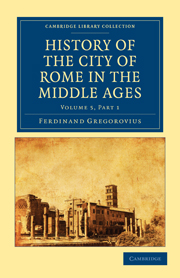CHAPTER VII
Published online by Cambridge University Press: 04 April 2011
Summary
We have already seen that, at the time of the return of Innocent IV., a citizen of Bologna, by his energy and greatness of mind, suddenly brought the senatorial office in Rome into high esteem, and imparted a transient splendour to the city. His rule and the constitution of the Roman republic, more especially during his time, deserve attentive consideration.
The podestàs of the republics of Italy
From the thirteenth century onwards the Italian free cities were accustomed to elect their podestàs from among the nobility of other communes with whom they stood in friendly relations. A stranger summoned to a six months' rule offered securer prospect of an impartial government, and less likelihood of the foundation of a tyranny, than the election of a powerful fellow-townsman would have done. Such an exchange of talents and energies between the democracies, who lent each other their most celebrated citizens as rectors, was the finest proof of republican fraternity and of common nationalties. It greatly redounds to the honour of the Italians. And since as a rule only men of importance were summoned to the office of podestà, the invitation was in itself the most genuine testimony to distinguished talent. The student who would become acquainted with the genuine flower of the aristocracy in the great century of the republics of Italy, with her noblest knights, generals, lawgivers, and judges, must read the lists of podestàs in individual democracies.
- Type
- Chapter
- Information
- History of the City of Rome in the Middle Ages , pp. 285 - 334Publisher: Cambridge University PressPrint publication year: 2010First published in: 1897



